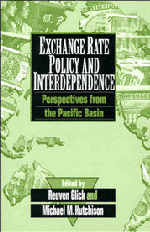Book contents
- Frontmatter
- Contents
- List of contributors
- Preface
- Exchange rate policy and interdependence
- 1 Overview
- I International financial market integration
- II Choice of exchange rate regimes
- III Intervention and sterilization policies
- 10 Monetary policy, intervention, and exchange rates in Japan
- 11 The signaling effect of foreign exchange intervention: the case of Japan
- 12 Sterilization of the monetary effects of current account surpluses and its consequences: Korea, 1986–1990
- IV Prospects for a yen bloc
- Index
12 - Sterilization of the monetary effects of current account surpluses and its consequences: Korea, 1986–1990
Published online by Cambridge University Press: 04 May 2010
- Frontmatter
- Contents
- List of contributors
- Preface
- Exchange rate policy and interdependence
- 1 Overview
- I International financial market integration
- II Choice of exchange rate regimes
- III Intervention and sterilization policies
- 10 Monetary policy, intervention, and exchange rates in Japan
- 11 The signaling effect of foreign exchange intervention: the case of Japan
- 12 Sterilization of the monetary effects of current account surpluses and its consequences: Korea, 1986–1990
- IV Prospects for a yen bloc
- Index
Summary
Introduction
Whether the central bank of an open economy under a pegged exchange rate regime can keep its money supply under control is relevant both to balance–of–payments adjustment and to domestic stabilization policy. Regardless of the degree of capital mobility with a pegged rate, a restrictive monetary policy will induce reserves to accumulate, perhaps to an unmanageable size. This well–known result in the monetary theory of the balance of payments (e.g., Mundell, 1968; Johnson, 1973) illustrates the difficulty of achieving both domestic policy and external balance objectives by monetary policy.
Korea's current account surpluses from 1986 to 1989 had a strong expansionary effect on the money supply. To maintain the money supply within the target levels, monetary policy during the second half of the 1980s focused on absorbing the monetary effects of these current account surpluses. This essay undertakes a detailed examination of the monetary effects of a current account shock and the implications of efforts to sterilize such effects. In particular, it examines whether the Bank of Korea undertook policies to neutralize the monetary impacts of the current account surplus in 1986–9. Further, it assesses empirically the consequences of policy instruments utilized to curb the monetization of current account surpluses. It also asks what would have happened had Korea adopted a freely floating exchange rate system. The first question is answered by empirical examination of the domestic credit reaction function of the Bank of Korea.
- Type
- Chapter
- Information
- Exchange Rate Policy and InterdependencePerspectives from the Pacific Basin, pp. 287 - 314Publisher: Cambridge University PressPrint publication year: 1994
- 6
- Cited by



